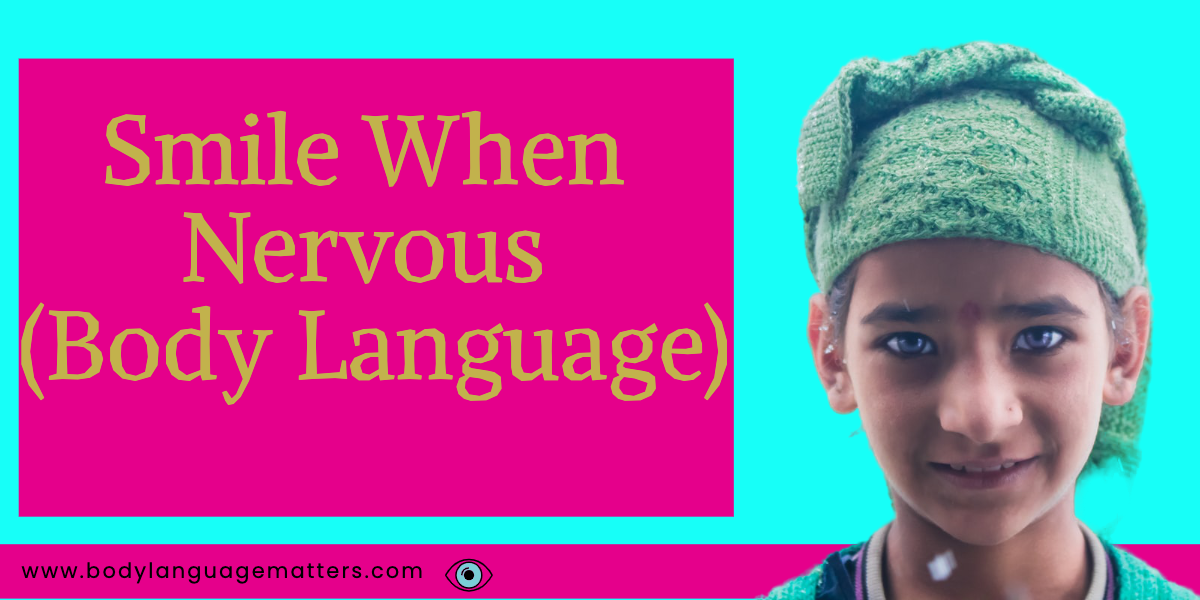In this article, we’ll take a look at why we smile when we’re nervous and how to control ourselves if (or when) it happens.
Smiling when you’re nervous is a great way to show those around you that you’re comfortable and confident. It can be a bit of a tricky balancing act, however, as you don’t want to come across as fake or disingenuous.
A good rule of thumb is to let your smile be genuine and make sure it reaches your eyes this is called a Duchenne smile. This will help put those around you at ease and make them more likely to smile back. We can use our body language to create a more positive outcome when we feel nervous, for more tips on that check out and improve your body language.
Quick Guide To Understand A Nervous Smile.
Understanding Nervous Smiles
A nervous smile is a type of smile that someone exhibits when they are uncomfortable or anxious. It’s a psychological mechanism that helps individuals deal with stressful situations. It might not be a genuine expression of happiness, but rather a sign of unease.
The Purpose of a Nervous Smile
The purpose of a nervous smile is often to mask the true emotions someone is feeling. It’s a form of self-defense mechanism, trying to show a façade of calm and happiness even when one is feeling the complete opposite.
Recognizing a Nervous Smile
A nervous smile might be a little forced or exaggerated. It can sometimes be identified by observing the eyes – they may not crinkle at the corners as they do with a genuine smile. Additionally, the smile may seem out of place or inappropriate for the situation.
Nervous Smiles and Body Language
In the context of body language, a nervous smile is usually accompanied by other signs of nervousness such as fidgeting, avoiding eye contact, or irregular speech patterns.
Cultural Differences in Nervous Smiles
It’s essential to consider cultural differences when interpreting a nervous smile. In some cultures, people may smile when they are nervous, embarrassed, or even in pain, while in others, this may not be the case.
Nervous Smiles in Professional Settings
In professional settings, nervous smiles can often be a sign of lack of confidence or unease. It’s essential to be aware of this, particularly in situations like job interviews, presentations, or meetings.
Nervous Smiles in Social Settings
In social settings, a nervous smile can indicate that a person feels uncomfortable or out of place. It could be a sign that they are trying to fit in or are worried about saying or doing the wrong thing.
Difference Between Genuine and Nervous Smiles
A genuine smile, often referred to as a Duchenne smile, involves both the mouth and the eyes. On the other hand, a nervous smile might only involve the mouth, and the eyes might not show the same level of engagement or emotion.
Managing Nervous Smiles
If you’re prone to nervous smiles, it might be helpful to develop strategies for managing them. This might involve deep breathing exercises, mindfulness techniques, or simply becoming more aware of your body language.
Nervous Smiles as an Emotional Outlet
Despite the negative connotations, a nervous smile can also act as an emotional outlet. It can be a way for people to release tension and potentially ease their feelings of nervousness or stress.
What Does A Nervous Smile Look Like?

Sometimes, people show a fleeting smile that barely appears and disappears. The eyes are always tense and constantly darted as if at any second it could disappear like smoke. Sometimes, the happy smile is there for so long that it starts to look unnatural.
Why Do We Smile When We Are Nervous?
There are many theories to answer this question. Some say it’s because of the way we evolved and others say that smiling is a social cue that tells others you’re friendly. One of the main reasons we smile when we feel nervous is to try and make ourselves feel better and also others around use.
If you’re smiling by yourself, that can feel strange. There’s nobody else to share the smile with and it feels as if you’re just standing there with a big grin on your face because you feel nervous. A nervous smile is a way of regulating yourself and others around you.
Another reason for the nervous smile is to test the waters, if you are being told off or talked to strictly you may flash a nervous smile in order to see if the person really means what they are saying.
Sometimes, a person’s mood may not just be low because they’re experiencing a bad situation. If someone looks angry or distressed, then it may actually be that they need emotional support. Smiling at them can help you figure out whether that person needs to cry or just need some reassurance or not.
How To Use A Nervous Smile?
When you are presenting, it is not advised to look nervous and desperate. A nervous smile could give people the impression that you are unsure of yourself and struggling with your emotions.
If a sympathetic viewer sees the pain in your body language (nervous smile), they may work to help you get out of this negative emotional state.
We often see people being nervous before giving a speech in front of a group. Your friend is nervous, too. It’s important to not criticize the person and instead offer encouragement like a hug or pat on the back so they can feel better about what they have to do.
Therefore, a self-conscious smile can be used to demonstrate optimism and friendliness to others.
Positive Attributes of a Nervous Smile
- Smiling when nervous can help you feel better.
- It can also make the other person feel more comfortable and aware you are pushing your limits.
- People are usually more receptive to you and open to your ideas when you’re smiling nervously or not.
- Nervous smiling is a powerful tool for social interactions and can help you get what you want out of them and regulate your emotions.
Is there a way to stop ‘smiling’ when I’m nervous or angry?
There are a few things you can do to try and stop smiling when you’re feeling nervous or angry. Squeeze your toes in your shoes when you feel nervous; this will help you focus your brain on a different part of your body and take the negative energy away.
Another is to focus on something else and try to distract yourself from the feeling of nervousness or anger.
Finally, you can try to breathe deeply and slowly, which can help to calm your nerves.
Just remember that simply forcing a smile isn’t enough to calm yourself. You need to focus on something pleasant: a scenic view, a memory of someone you love, or the sensation of the breath passing through your nostrils.
Questions And Answers.
1. Why do people smile when they’re nervous?
One reason people might smile when they’re nervous is that they’re trying to show that they’re friendly and approachable. Smiling can be contagious, so if someone smiles at you, you’re likely to smile back.
This might make the other person feel more comfortable, and in turn, reduce their nervousness. Additionally, smiling releases endorphins, which can help to improve your mood and lower stress levels.
2. What does a smile mean when someone is nervous?
When someone smiles while they are nervous it is often a sign that they are trying to cover up their fear or anxiety. A smile can also be a sign of relief.
3. Why do we smile when we’re uncomfortable?
A smile can be a sign of relief, happiness, or just a way to defuse a tense or awkward situation. It can also be a learned response to certain social cues. In some cases, people may smile when they’re uncomfortable because they’re trying to appear friendly or polite.
4. Why do I smile at inappropriate times?
There could be many reasons why someone might smile at inappropriate times. It could be a nervous reaction or a way of trying to diffuse a tense or awkward situation. It could also be that the person is enjoying the situation, even though it might be seen as inappropriate by others.
Summary
When we smile, it can help improve our mood and lower stress levels. A nervous smile tries to simulate the same thing. A nervous smile can also be a way of trying to cover up fear or anxiety.
If you’re not sure if someone’s smile is genuine, look for clues like if the whole face is involved and if the person seems genuinely happy. In some cases, people may smile when they’re uncomfortable because they want to appear friendly or polite.
If you have enjoyed learning about the nervous smile, please check out our other articles on the topic here.

